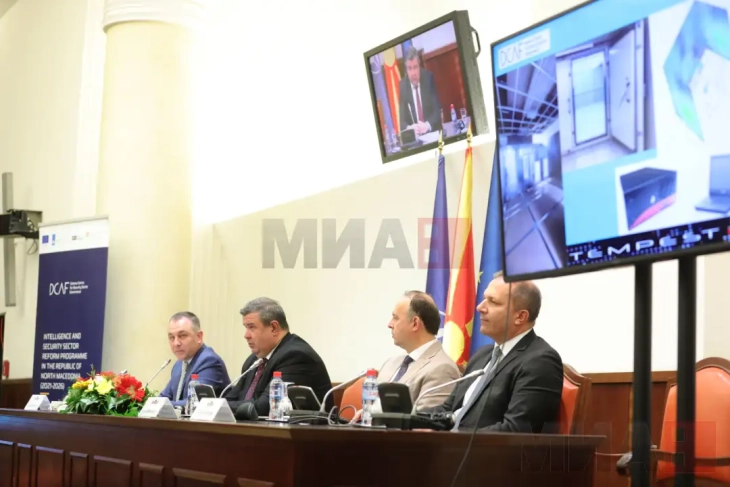Parliament puts into use shielded room for management of classified information
- A shielded room, the first of its kind in North Macedonia, designed with the highest level of protection for highly classified documents, was put into use in the Parliament on Monday.

Skopje, 21 October 2024 (MIA) - A shielded room, the first of its kind in North Macedonia, designed with the highest level of protection for highly classified documents, was put into use in the Parliament on Monday. The room will primarily be used by the Parliament and committees working with classified documents, but it can also be used by other state authorities upon the Parliament's approval.
The room, according to Parliament Speaker Afrim Gashi, meets all audio and anti-radiation standards, equipped to guarantee the security of classified information in accordance with the highest TEMPEST standards for radiation protection, which is part of a broad multi-year project funded by the UK, Switzerland, EU, and the Netherlands, implemented by the Geneva Centre for Security Sector Governance (DCAF).
"Protected, silent, or shielded room - are some of the names used to refer to the room built in such a way that electromagnetic waves do not penetrate into or out of it," Gashi said.

In 2017, government and opposition lawmakers agreed on the need for this room in Parliament, as part of the set of measures to improve oversight of secret services.
"The shielded room improves the Parliament's oversight role, on which we have been focused on since the start of our mandate. The room was not a requirement stemming from the memorandum of understanding with DCAF, but one by NATO. Thus, its construction process, procurement and functionality were especially complex. I am pleased to say that my predecessors, MPs from previous parliamentary compositions, along with other services and partners, remained committed to building this room, adhering to the highest NATO standards, with respect to a complex tender procedure while applying NATO standards," Gashi stressed.
The shielded room and shielded workspace are designed to meet strict security requirements imposed by NATO and EU, which includes the integration of technological safeguards, and the physical space is constructed of materials that prevent unauthorized surveillance and wiretapping, ensuring that communications remain confidential and protected from external threats. The project incorporates the best practices of security sector management and provides adaptability to future advances in security surveillance and intelligence.

VMRO-DPMNE whip Nikola Micevski pointed out that the construction and commissioning of the shielded room rounds up nearly seven years of work, effort and efforts to strengthen the Parliament's capacities for parliamentary oversight over security services.
"The room creates a safe environment and protected workspace for handling classified information of the highest degree, without the risk of leakage or unauthorized access," Micevski explained.
According to the law on classified information adopted in 2019, as part of the package on reform laws, with the construction of such a room, Parliament undertakes the strictest measures and activities for administrative, physical, and industrial security, and protection of communication and information, and handlers of classified information.

SDSM whip and former Interior Minister Oliver Spasovski stressed that this process strengthens the Parliament's capacity, not only from a security aspect, but will also significantly improve parliamentary control of security services in the process of monitoring communications.
"We’ve shown that NATO membership can motivate us, and that we can be relevant and good factors by strengthening capacities. This process helped us prove that it is important to build democratic institutions in the country and thus provide space and opportunity to preserve human freedoms and rights," highlighted Spasovski.

Swiss Ambassador Veronique Hulmann, chair of the Commission for Supervision of Security and Intelligence Services at the Slovenian Parliament, Janez Žakelj, DCAF Ljubljana director Andrej Rupnik, and directorate for Security of Classified Information director Stojan Slaveski also addressed the event.
Ambassador Hulmann said that Parliament can now work with the highest level of security, but that the co-financing assistance from DCAF countries was key for realizing the room.
Žakelj stressed that parliamentary oversight is very important and that its role is crucial for security, but that these services should still protect the rights of citizens.
According to him, the work of the security services is secret and therefore oversight is a necessity. He also added that well-defined safeguards are needed, as well as that a strong legal framework that will prevent abuse. ssh/ik/
Photo: MIA, Parliament, DCAF







